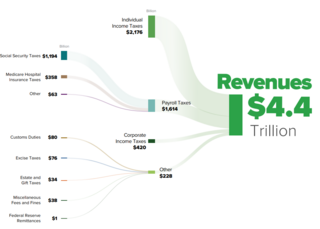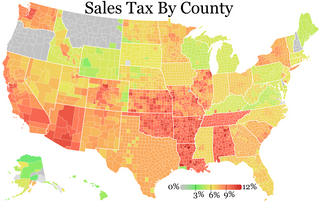
Reaganomics, or Reaganism, were the neoliberal economic policies promoted by U.S. President Ronald Reagan during the 1980s. These policies are characterized as supply-side economics, trickle-down economics, or "voodoo economics" by opponents, including some Republicans, while Reagan and his advocates preferred to call it free-market economics.

The United States has separate federal, state, and local governments with taxes imposed at each of these levels. Taxes are levied on income, payroll, property, sales, capital gains, dividends, imports, estates and gifts, as well as various fees. In 2020, taxes collected by federal, state, and local governments amounted to 25.5% of GDP, below the OECD average of 33.5% of GDP.
A flat tax is a tax with a single rate on the taxable amount, after accounting for any deductions or exemptions from the tax base. It is not necessarily a fully proportional tax. Implementations are often progressive due to exemptions, or regressive in case of a maximum taxable amount. There are various tax systems that are labeled "flat tax" even though they are significantly different. The defining characteristic is the existence of only one tax rate other than zero, as opposed to multiple non-zero rates that vary depending on the amount subject to taxation.

The Department of the Treasury (USDT) is the national treasury and finance department of the federal government of the United States, where it serves as an executive department. The department oversees the Bureau of Engraving and Printing and the U.S. Mint. These two agencies are responsible for printing all paper currency and minting coins, while the treasury executes currency circulation in the domestic fiscal system. It collects all federal taxes through the Internal Revenue Service; manages U.S. government debt instruments; licenses and supervises banks and thrift institutions; and advises the legislative and executive branches on matters of fiscal policy. The department is administered by the secretary of the treasury, who is a member of the Cabinet. The treasurer of the United States has limited statutory duties, but advises the Secretary on various matters such as coinage and currency production. Signatures of both officials appear on all Federal Reserve notes.

France is divided into eighteen administrative regions, of which thirteen are located in metropolitan France, while the other five are overseas regions.

The federal government of the United States is the common government of the United States, a federal republic located primarily in North America, comprising 50 states, five major self-governing territories, several island possessions, and the federal district of Washington, D.C., where the majority of the federal government is based.
In accounting, revenue is the total amount of income generated by the sale of goods and services related to the primary operations of the business. Commercial revenue may also be referred to as sales or as turnover. Some companies receive revenue from interest, royalties, or other fees. "Revenue" may refer to income in general, or it may refer to the amount, in a monetary unit, earned during a period of time, as in "Last year, company X had revenue of $42 million". Profits or net income generally imply total revenue minus total expenses in a given period. In accounting, revenue is a subsection of the equity section of the balance statement, since it increases equity. It is often referred to as the "top line" due to its position at the very top of the income statement. This is to be contrasted with the "bottom line" which denotes net income.

The Inland Revenue was, until April 2005, a department of the British Government responsible for the collection of direct taxation, including income tax, national insurance contributions, capital gains tax, inheritance tax, corporation tax, petroleum revenue tax and stamp duty. More recently, the Inland Revenue also administered the Tax Credits schemes, whereby monies, such as Working Tax Credit (WTC) and Child Tax Credit (CTC), are paid by the government into a recipient's bank account or as part of their wages. The Inland Revenue was also responsible for the payment of child benefit.

His Majesty's Revenue and Customs is a non-ministerial department of the UK Government responsible for the collection of taxes, the payment of some forms of state support, the administration of other regulatory regimes including the national minimum wage and the issuance of national insurance numbers. HMRC was formed by the merger of the Inland Revenue and HM Customs and Excise, which took effect on 18 April 2005. The department's logo is the Tudor Crown enclosed within a circle.

In addition to federal income tax collected by the United States, most individual U.S. states collect a state income tax. Some local governments also impose an income tax, often based on state income tax calculations. Forty-one states, the District of Columbia, and many localities in the United States impose an income tax on individuals. Eight states impose no state income tax, and a ninth, New Hampshire, imposes an individual income tax on dividends and interest income but not other forms of income. Forty-seven states and many localities impose a tax on the income of corporations.

Sales taxes in the United States are taxes placed on the sale or lease of goods and services in the United States. Sales tax is governed at the state level and no national general sales tax exists. 45 states, the District of Columbia, the territories of Puerto Rico, and Guam impose general sales taxes that apply to the sale or lease of most goods and some services, and states also may levy selective sales taxes on the sale or lease of particular goods or services. States may grant local governments the authority to impose additional general or selective sales taxes.

The California State Board of Equalization (BOE) is a public agency charged with tax administration and fee collection in the state of California in the United States. The authorities of the Board attempt to ensure that counties fairly assess property taxes, collect excises taxes on alcoholic beverages, administer the insurance tax program, and other tax collection related activities.

The Indian Revenue Service, often abbreviated as IRS, is a civil service that is primarily responsible for collecting and administering direct and indirect taxes. As a central civil service under Group A of the executive branch of the Government of India, it functions under the Department of Revenue of the Ministry of Finance and is under the administrative direction of the Revenue Secretary and the ministerial command of the Minister of Finance.
A hotel tax or lodging tax in the United States is a tax levied by states, cities or counties against travellers when they rent accommodations in a hotel, inn, tourist home or house, motel, or other lodging, generally unless the stay is for a period of 30 days or more. In addition to sales tax, it is collected when payment is made for the accommodation, and it is then remitted by the lodging operator to the city or county. It can also be called hotel occupancy tax in places like New York City and Texas. Despite its name, it generally applies to the same range of accommodations.
Under Article 108 of the Basic Law of Hong Kong, the taxation system in Hong Kong is independent of, and different from, the taxation system in mainland China. In addition, under Article 106 of the Hong Kong Basic Law, Hong Kong has independent public finance, and no tax revenue is handed over to the Central Government in China. The taxation system in Hong Kong is generally considered to be one of the simplest, most transparent and straightforward systems in the world. Taxes are collected through the Inland Revenue Department (IRD).
The Ministry of Law and Justice in the Government of India is a cabinet ministry which deals with the management of the legal affairs, legislative activities and administration of justice in India through its three departments namely the Legislative Department and the Department of Legal Affairs and the Department of Justice respectively. The Department of Legal Affairs is concerned with advising the various Ministries of the Central Government while the Legislative Department is concerned with drafting of principal legislation for the Central Government. The ministry is headed by Cabinet Minister of Law and Justice Arjun Ram Meghwal appointed by the President of India on the recommendation of the Prime Minister of India. The first Law and Justice minister of independent India was Dr. B. R. Ambedkar, who served in the Prime Minister Jawaharlal Nehru's cabinet during 1947–51.

The government of Vermont is a republican form of government modeled after the Government of the United States. The Constitution of Vermont is the supreme law of the state, followed by the Vermont Statutes. This is roughly analogous to the Federal United States Constitution, United States Code and Code of Federal Regulations respectively. Provision is made for the following frame of government under the Constitution of the State of Vermont: the executive branch, the legislative branch, and the judicial branch. All members of the executive and legislative branch serve two-year terms including the governor and senators. There are no term limits for any office.

The Royal Malaysian Customs Department ; is a government department body under the Ministry of Finance. RMCD functions as the country's main indirect tax collector, facilitating trade and enforcing laws.

South Carolina government and politics covers the three different branches of government, as well as the state constitution, law enforcement agencies, federal representation, state finances, and state taxes. South Carolina is a state in the United States of America and was the eighth admitted to the Union. The state of South Carolina was preceded by the Crown Colony of South Carolina, a constitutional monarchy which was overthrown during the American Revolution. Presently, South Carolina's government is formed as a representative democracy.

The Income Tax Department is a government agency undertaking direct tax collection of the government of the Republic of India. It functions under the Department of Revenue of the Ministry of Finance. The Income Tax Department is headed by the apex body Central Board of Direct Taxes (CBDT). The main responsibility of the Income Tax Department is to enforce various direct tax laws, most important among these being the Income-tax Act, 1961, to collect revenue for the government of India. It also enforces other economic laws such as the Benami Transactions (Prohibition) Act, 1988, and the Black Money Act, 2015.














